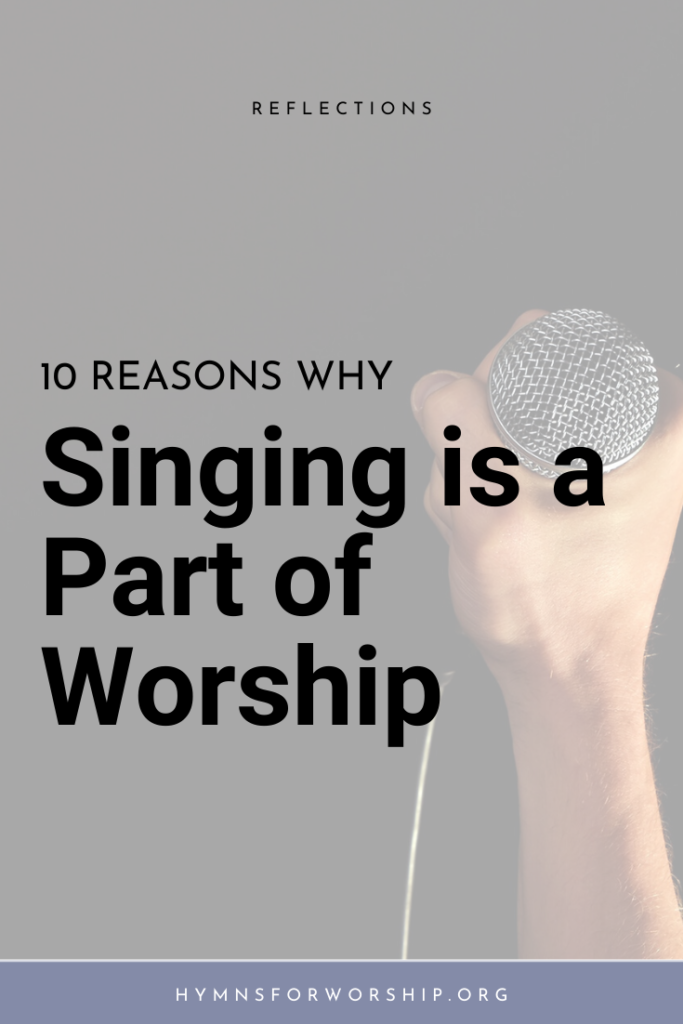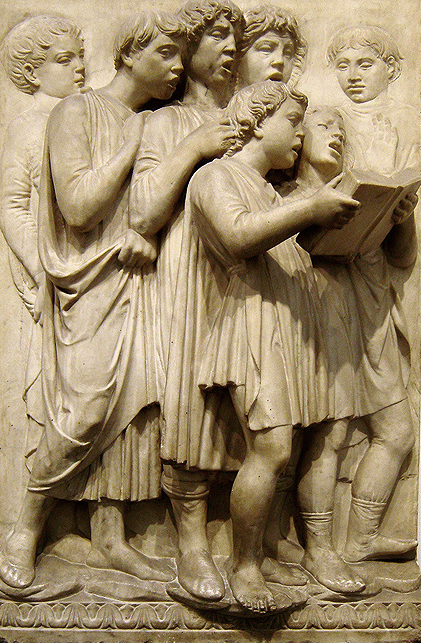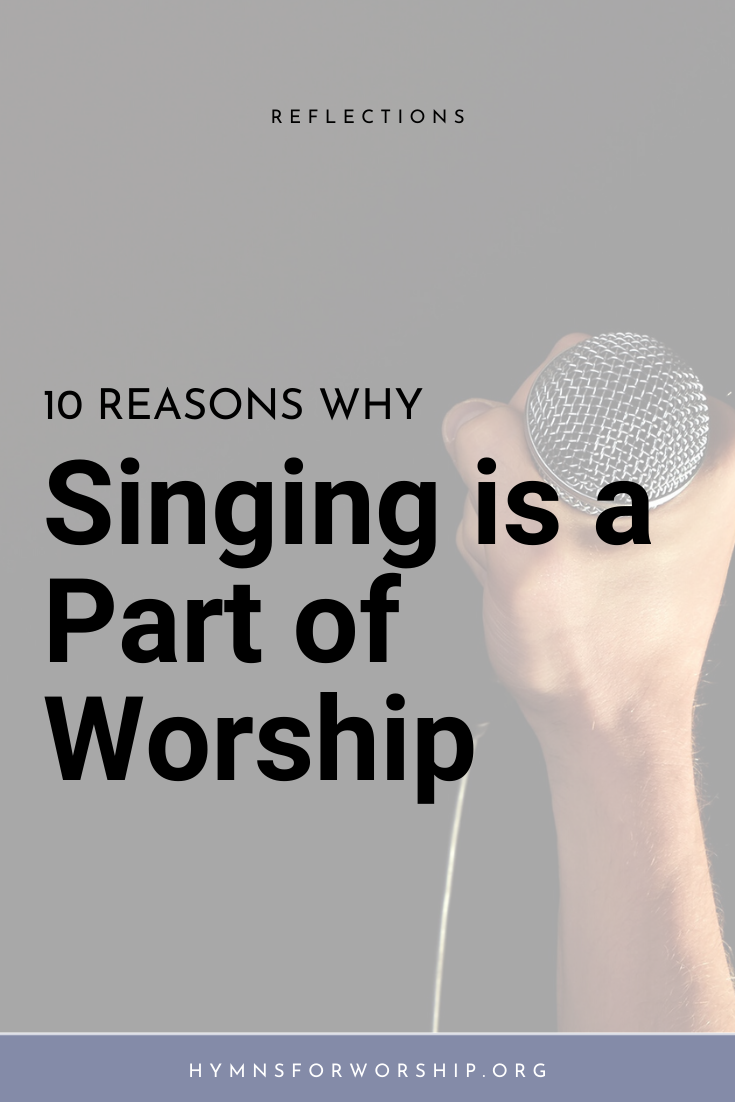
There are times when I wonder why God chose singing as a main mode of expressing praise to Him. As a musician, I think about these things because it helps me know the importance of this “musical tool” I deal with every day.
I mean why not say, “To open our worship we shall all look at a painting by Brother so and so.” Or, “Let us respond to the message by jumping for joy.” I know these modes of expression are done and can be done in worship services, but it’s not the norm. More often than not, whenever other art forms are used in worship, it is still accompanied by music.
Now when we talk about music — it can still be a vast art form. But I think you can agree with me when I say that vocal music is the most common way music is done in the church. Not negating the fact that musical instruments are also used, but singing… there’s something about belting out words in melody when worshiping God.
So I came up with 10 reasons why singing is a part of worship. There can be more, but you can help me figure all of that later.
1. Singing was used in heaven to worship God.
There are examples in the Bible which refers to angels praising God (See Luke 2:13-14, Revelation 5). Many are not sure as to whether the angels were actually singing in these instances. But, there are numerous occasions where angels sang. Here are two examples as recorded in the Spirit of Prophecy:
I saw the beauty of heaven. I heard the angels sing their rapturous songs, ascribing praise, honor, and glory to Jesus.
Voice in Speech and Song, 427.
The angels would sing a lovely song, then they would cease singing and take their crowns from their heads and cast them glittering at the feet of the lovely Jesus, and with melodious voices cry, “Glory, Alleluia!”
Early Writings, 66.
If singing was one of the means by which the angels praised God, shouldn’t we endeavor to sing praises to God as well?
2. We are mandated by the Bible to sing when worshiping corporately.
The word sing appears 119 times in the Bible, while singing, 25. That is enough evidence that we should also sing. Here are a few examples of singing particularly in corporate worship:
- Psalm 149:1 (praise Him “among the congregation”)
- Psalm 21:13 (note the words “we sing”)
- Psalm 57:9 (sing “among the nations”)
- Psalm 95:1 (let “us” make)
- Colossians 3:16 (admonish “one another” in psalms, hymns and spiritual songs)
3. Singing is more commonly accessible to people compared to playing a musical instrument.

In western music history, it has been said that singing is so basic and second nature to man, that it actually predates the development of the spoken language.
I’m not so sure about that. But this I am sure about –that there is no human culture, however remote or isolated they may be, that does not sing. There are extensive records that early on, singing played a very important role in communicating to God.
When we read thru the book of Psalms, we see a plethora of musical instruments used in the Bible. The cymbals, lyre, trumpets and timbrel were extensively used in worship.
But of course we see more of antiphonal (alternating congregational groups) and responsorial (a group of singers responding to a soloist) singing.
After the destruction of Jerusalem in 70 AD, the Jewish people were dispersed. For a time, their music became exclusively vocal mainly because obviously, it was the most portable instrument they can carry as they flee.
For centuries, vocal music was a main tool that was used in the church, not only because it was preferred over instruments, but because it was easily accessible.
Aside from people with speaking disabilities, everyone else is given the power to communicate with the voice. Unlike playing musical instruments which can take years to develop as a skill, almost anyone can sing.
4. Singing can clearly communicate a message compared to music alone.
Musical instruments are wonderful tools of making music. They can produce different sonorities that not even the best singer can pull off. The music produced by instruments alone has the ability to bring out feelings that you weren’t even aware that you had.
A lone melody on the cello or a somber tune played by the piano can make us cry and reach our very core. Or even give us the chills. Sometimes it’s all the more powerful because of the absence of words.
Feelings are hard to describe. Sometimes, no words can perfectly depict the raw emotions that we feel.
An affectionate look from a loved one across the room can convey more love than the words “I love you,” a meaningful touch can exude feelings of solicitude.
Listening to instrumental music can be like that. It tries to bring across those emotions without using words. And there are times when that works perfectly well.
On the other hand, words and vocal music combined introduce a very different experience to the table. It’s a powerful experience that music alone cannot pull off. With words, the listener is not left guessing what the message is all about.
I like how this guy describes the importance of words in a song:
When words and music are put together cohesively, songs create more concrete and specific experience that instrumental music has a hard time to. The specificity of words make the song less universal than pure emotions, but when it hits you it can hit deep. Instrumental music can give you chills but it’s harder to make you burst out laughing or weep in sorrow. Music gives more general feelings but words can really drive it home.
Ari Koinuma
The songs we sing in worship should give us that precise experience. We are not left to guess around and praise God with just our feelings. The lyrics drive it home for us, making our worship experience more telling.
5. Singing is a medium through which the congregation can respond.
Have you ever been in a one-way conversation with someone? You know, when one person keeps talking and the other person can barely get a word in. Bad conversation.
Good conversations mean both sides get to talk and bring their messages across clearly. However, a really good conversation is when someone talks to us, we listen, and when we respond, we verbalize our thoughts concisely. A really good conversation keeps going.
Our worship experience is designed to not just be good, but a really good conversation with God. God talks to us, and we respond. As He talks, we listen, and then we respond again. Through the reading of the Scriptures and the preaching and breaking down of the Word, we hear God talking to us. As we continue to listen, the Holy Spirit convicts us of sins we need to repent of and impresses our hearts to change.
There are many elements in worship that help us respond. While someone prays in front, we silently pray, while someone reads the Scripture, we can sometimes silently read along. When we listen to the sermon, we respond by saying “Amen,” or we occasionally nod our head in agreement.
But did you notice? All those responses are either silent or short. However, it is in the congregational singing wherein you and I, can carry on our dialogue in worship with God.
6. Singing is one of the most effective means to impress the heart with truth.
It was not by sermons, testimonies, prayers, and writings alone that the Reformation movement grew. Martin Luther used songs to spread the gospel message, and it became an important vehicle to win souls to Christ.
Good music touches and softens the heart. A doctrine that can be seemingly hard to swallow when spoken can be easily digestible in music format. Singing opens the way for truth to hit home.
Lucifer experienced this first hand in heaven. When the announcement was made that Jesus Christ was to be worshiped as the Son of God, the following events happened:
The angels joyfully acknowledged the supremacy of Christ, and prostrating themselves before Him, poured out their love and adoration. Lucifer bowed with them, but in his heart there was a strange, fierce conflict. Truth, justice, and loyalty were struggling against envy and jealousy. The influence of the holy angels seemed for a time to carry him with them. As songs of praise ascended in melodious strains, swelled by thousands of glad voices, the spirit of evil seemed vanquished; unutterable love thrilled his entire being; his soul went out, in harmony with the sinless worshipers, in love to the Father and the Son.
Patriarchs and Prophets, 36.
Lucifer was not stupid. He was not mindlessly bowing to Christ in the thrill of the moment. He knew the truth. The song sung by the angels was but a medium through which the truth about worshipping Christ was carried. And as the account was written, his soul went out. His heart was impressed by the truth. But sadly, pride and vainglory got in the way of things.

7. Singing God’s praises is one of the chief ways we can be encouraged in worship.
I’ve heard it said that worshiping is like a going to a hospital, where people go to get spiritual healing. Many elements of worship help us in our Christian walk, and singing is primarily one of those. When we are tempted, instead of talking about our feelings to fellow church members, let us by faith lift up a song of thanksgiving to God.
When assailed with life’s trials, sing!
Be still, my soul: the Lord is on thy side;
Bear patiently the cross of grief or pain;
Leave to thy God to order and provide;
In every change He faithful will remain.
When seeking freedom from sin, sing!
Long my heart has sighed for Thee;
Long has evil reigned within;
Jesus sweetly speaks to me:
“I will cleanse you from all sin.”
When longing to be healed from sickness, sing!
I lay my wants on Jesus,
All fullness dwells in Him;
He healeth my diseases
He doth my soul redeem,
He doth my soul redeem
Song is a weapon that we can always use against discouragement. If we use this to our advantage, every worship experience will be a tremendous source of health and blessing.
8. Singing provides us a thrilling experience in worship.
Have you ever felt that exhiliration when you’re singing in church? You’re singing your heart out with the words, “Then sings my soul, my Saviour God to Thee, How great Thou art, How great Thou art!” or maybe “All that thrills my soul is Jesus, He is more than life to me.” Just writing these very words while picturing myself singing it in worship give me the goosebumps. But why do we get feelings of soaring and happiness when we sing?
Well, let’s get a little scientific.
In a recent study reported by TIME Magazine, singing in a group, choir or congregation has proved to be physiologically beneficial. They found out that endorphins, the hormone that is responsible for giving us feelings of pleasure, are released when a person sings. They also found out that oxytocin, another hormone that helps alleviate stress and anxiety, are released as well.
Our bodies are designed to benefit from singing, which is not entirely a surprise, because the God who made us loves music!
9. Jesus sang!
What better example do we have than Christ?
Christ was often heard singing hymns of praise…and that the Lord Himself rejoices over His church with singing.
Welfare Ministry, 93
Christ descended to poverty that He might teach how closely in our daily life we may walk with God…He often held communion with heaven in song. The men of Nazareth often heard His voice raised in prayer and thanksgiving to God; and those who associated with Him, who often complained of their weariness, were cheered by the sweet melody that fell from His lips.
Review & Herald, October 24, 1899.
10. Singing in our worship on earth prepares us for worship in heaven.
In the early Advent movement the hymns on the subject of the coming of the Lord, sung with intense earnestness and solemnity had a wonderful effect on the hearers. They sang with heart and soul and voice, and with telling effect, the message of Christ’s coming.
One Adventist pioneer related that it was because of the mighty converting power of the first advent song he heard that brought him his first acquaintance with the First Angel’s Message. At one time an Adventist company was arrested for disturbing the people with their singing. At the command of the judge before whom they were tried, they sang three of the thrilling Advent hymns, and were set free at once with the statement that, “If people are disturbed with that kind of singing they ought to be disturbed.”
It will not be surprising if singing these kind of songs will have the same effect in the closing days of earth’s history. Every great religious movement has had music of its own, appropriate for the time and the occasion, and for the special message. This message in its closing power will have such music. We shall have a far greater revival of distinctive Advent singing appropriate for the most solemn and awful crisis the world has ever known. Singing songs when sung with the Advent spirit, bring into the meetings the presence and power of God. Try it out for yourself!
Let us fill our worship with songs about the coming of Christ, of the heavenly home, and of the great truths of our distinctive message. God will no doubt have some music written directly for the closing work, but many of the old hymns, if sung with the spirit, can still bring a mighty blessing to God’s people.
In our song services, let us revive the true Advent singing that will shake the world, and hasten the time when we shall join in the great victory song of Moses and the Lamb at the coming of our Lord and Savior Jesus Christ.
God is high and holy; and to the humble, believing soul, His house on earth, the place where His people meet for worship, is as the gate of heaven. The song of praise, the words spoken by Christ’s ministers, are God’s appointed agencies to prepare a people for the church above, for that loftier worship.
Youth Instructor, Oct. 8, 1896.
Like this article? Share it!


